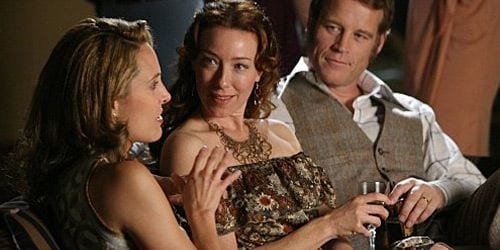
The opening credits of the now canceled CBS series Swingtown begins with a series of cheeky clichés of the ‘70s: roller rinks, mood rings, Farrah Fawcett hair and disco grooving. Like a cliffs notes version of this period in pop culture history, the opening credits try to remind us of the major signposts of the time in a pop culture pastiche.
Unfortunately, much of the show reflects that same sensibility, as if the mood of an entire decade could be boiled down to set dressing—one character even dons a look-alike John Travolta suit while line dancing in a disco. It doesn’t help that almost every few minutes a recognizable music hit is played making the show at times feel like a music video.
Swingtown centers around Susan and Bruce Miller, a naïve couple with two kids who move into an affluent Chicago area suburb only to find that their new neighborhood is full of swingers. Leaders of the swinger pack are Tom and Trina Decker, a freewheeling airline pilot and his wife who seem to have endless parties in their backyard pool and countless encounters with other couples in their bed.
Attractive, toned and tan, Tom and Trina are the cool kids on the block and their house and lifestyle seduces Bruce and Susan all season long. On their first night at a party at Tom and Trina’s house, Bruce and Susan go to bed with them, an action that is dealt with so lightly and casually when one would expect there to be at least a moment’s hesitation (and it should be mentioned, without any footage of the deed being done), that it almost feels like it didn’t happen.
Bruce and Susan’s sexual awakening—this is the first time either one has had sex with another person—causes havoc with their old friends Janet and Roger Thompson. Janet and Roger are the tightly wound squares from their old neighborhood who can’t understand Bruce and Susan’s new found interest in Quaaludes and the Playboy Club. Yet the two of them, and especially Janet, as engagingly played by Miriam Shor in all her neurotic splendor, actually prove to be some of the more human and recognizable characters on the show.
Despite the notion that it seemed like nothing happened, the ’70s is in fact rich with material for a television show, not the least of which includes many of the “me” decade’s most memorable legacies: the consequences of the sexual liberation of the ‘60s coupled with the rise of the women’s movement, the rise of therapy, and the Watergate scandal and its aftermath. Swingtown attempts to provide discussions about all of these things, but they often feel clunky and tacked on instead of organic to the storyline.
It’s difficult not to compare Swingtown with Mad Men, the rich period drama of the early ‘60s on AMC. Where each of the characters on Mad Men both reflect and transcend their time, simultaneously exploring the forces of history that determine their fates while also debunking many preconceived notions a modern audience would have of the perfectly coiffed women and men on the show, the characters on Swingtown seem locked into the confines of our stereotypes of the ‘70s. Was nearly every married couple really a swinger? What about those who do not fit into those stereotypes?
At times, Swingtown delves below the surface. We learn for example, that despite her easygoing appearance and feminist preaching Trina is not always happy about the swinging lifestyle yet is hesitant to tell her husband, and that the consequences of Bruce and Susan’s actions may not be as liberating as they first appear. But eventually Swingtown devolves into a bunch of cheating and bed hopping more reminiscent of a daytime soap than a period drama.
There are side storylines involving Bruce and Susan’s children, but those too revolve around their budding sexuality. In fact by the end of the show it seems there is little else going on in Bruce and Susan’s neighborhood. Most of all, it’s unclear what Swingtown actually wants to be. Swingtown has an intriguing premise and the cast is uniformly solid, but the show does not have a real identity or fresh point of view.

![Call for Papers: All Things Reconsidered [MUSIC] May-August 2024](https://www.popmatters.com/wp-content/uploads/2024/04/all-things-reconsidered-call-music-may-2024-720x380.jpg)



